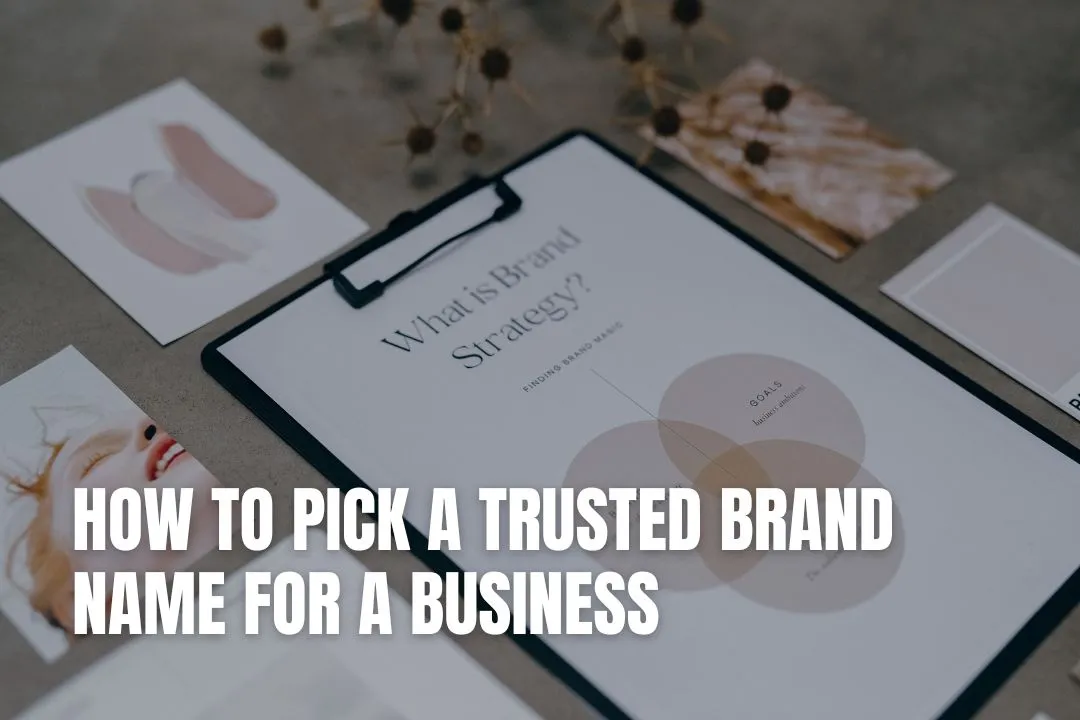
Editorial Disclaimer
This content is published for general information and editorial purposes only. It does not constitute financial, investment, or legal advice, nor should it be relied upon as such. Any mention of companies, platforms, or services does not imply endorsement or recommendation. We are not affiliated with, nor do we accept responsibility for, any third-party entities referenced. Financial markets and company circumstances can change rapidly. Readers should perform their own independent research and seek professional advice before making any financial or investment decisions.
A strong brand name is more than just a label – it’s the first impression your business will have with new clients. Get it right, and it can build trust with customers and set you apart from competitors.
Choosing the right business brand name takes more than a quick brainstorming session. It requires strategy and a clear understanding of your target audience.
This guide, written by experts at the UK’s leading company registration agent, Rapid Formations, outlines the key steps in creating a memorable brand name that aligns with business goals and target markets.

Before customers have read your website, explored your products, or spoken to your team, they’ve already judged your brand name. That split-second impression can influence whether they view a company as credible or not.
A strong brand name helps you:
In short, a brand name isn’t just cosmetic; it should be a strategic decision that helps establish your business’s identity.
Here we’ll explore the six steps to follow for choosing your company brand name, from defining your brand identity to picking a name that still fits as your company grows.
Before listing possible names, you’ll need to understand what your brand stands for. If you’re a new business owner, ask yourself:
For example, a financial services business might want a name that conveys security and professionalism, while a lifestyle brand may lean towards a dynamic name. Looking at competitors in your sector will help guide your decision-making for a strong market fit.
The best brand names are easy to say and remember. If customers need to look up your name multiple times, it can lead to a loss of business.
Avoid names that are:
Instead, opt for clarity. Consider names that:
Simplicity signals confidence. A straightforward name is often more trustworthy than one that tries too hard.
Falling in love with a name only to discover it’s already taken can be disappointing. To avoid this, check:
Doing this due diligence early saves the headache of rebranding later and going back to the drawing board. What’s more, remember to avoid names that use sensitive words or expressions to avoid alienating potential partners or customers.
The most effective names don’t just describe a business – they resonate emotionally.
For example:
A name doesn’t have to spell out what a business does. Instead, it should create an association that supports the wider branding strategy.
Test your potential business names with real people. Share your ideas with colleagues, friends, or even members of the public who belong to your target audience.
Ask questions like:
Fresh perspectives can highlight overlooked issues, such as unintended meanings in other languages or negative connotations.
A business brand name should grow with the company. Avoid names that are too narrow or tied to a single product, as they may limit you further down the line.
For example, calling a company “UK Laptop Deals” might work now – but what happens when it starts selling smartphones or expands beyond the UK?
Selecting the right brand name is one of the most crucial business decisions. A strong name isn’t just about standing out – it’s about building trust, establishing credibility, and laying the groundwork for lasting success.
To recap, here’s the process:
Do you have a company name in mind, and are you ready to launch your venture? Explore expert guidance on setting up a business from Rapid Formations and register your company today.
Your brand name is often the very first impression a potential customer has of your business. A strong, professional name can build instant trust and recognition, helping you stand out from competitors before anyone has even seen your products or services.
Before thinking of names, you should define your brand identity. Ask yourself what your business stands for, who you want to reach, and what feeling you want your brand to create. This foundation will guide you to a name that truly fits.
You must perform due diligence. Check if the domain name (like .co.uk or .com) is available, and if you can get consistent usernames on social media platforms. Most importantly, ensure the name isn't already trademarked to avoid legal trouble.
Avoid names that are too narrow. For instance, 'London Cake Delivery' might be a problem if you expand to other cities or start selling baking supplies. Choose a name that is broad enough to accommodate future growth and new ventures.
Not at all. While a descriptive name can be clear, many of the strongest brands evoke a feeling or an idea rather than a literal description. Think of names like 'Apple' or 'Patagonia', they create an emotional connection that is more powerful than just describing their products.